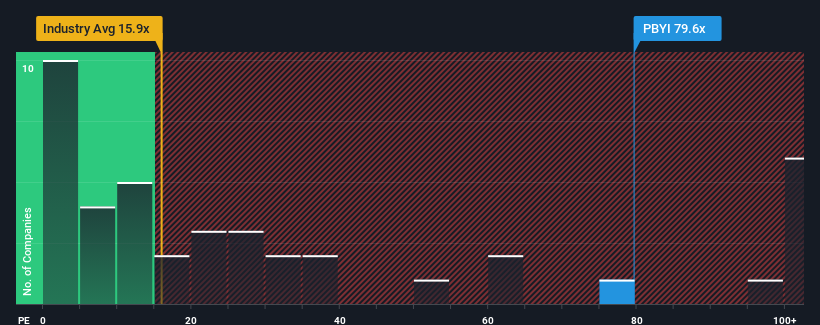- United States
- /
- Biotech
- /
- NasdaqGS:PBYI
There's Reason For Concern Over Puma Biotechnology, Inc.'s (NASDAQ:PBYI) Massive 31% Price Jump
Puma Biotechnology, Inc. (NASDAQ:PBYI) shares have continued their recent momentum with a 31% gain in the last month alone. Looking back a bit further, it's encouraging to see the stock is up 56% in the last year.
After such a large jump in price, given close to half the companies in the United States have price-to-earnings ratios (or "P/E's") below 16x, you may consider Puma Biotechnology as a stock to avoid entirely with its 79.6x P/E ratio. However, the P/E might be quite high for a reason and it requires further investigation to determine if it's justified.
Puma Biotechnology has been struggling lately as its earnings have declined faster than most other companies. One possibility is that the P/E is high because investors think the company will turn things around completely and accelerate past most others in the market. If not, then existing shareholders may be very nervous about the viability of the share price.
View our latest analysis for Puma Biotechnology

What Are Growth Metrics Telling Us About The High P/E?
Puma Biotechnology's P/E ratio would be typical for a company that's expected to deliver very strong growth, and importantly, perform much better than the market.
Taking a look back first, the company's earnings per share growth last year wasn't something to get excited about as it posted a disappointing decline of 65%. At least EPS has managed not to go completely backwards from three years ago in aggregate, thanks to the earlier period of growth. So it appears to us that the company has had a mixed result in terms of growing earnings over that time.
Looking ahead now, EPS is anticipated to slump, contracting by 16% per annum during the coming three years according to the dual analysts following the company. Meanwhile, the broader market is forecast to expand by 11% per annum, which paints a poor picture.
With this information, we find it concerning that Puma Biotechnology is trading at a P/E higher than the market. It seems most investors are hoping for a turnaround in the company's business prospects, but the analyst cohort is not so confident this will happen. Only the boldest would assume these prices are sustainable as these declining earnings are likely to weigh heavily on the share price eventually.
The Bottom Line On Puma Biotechnology's P/E
Puma Biotechnology's P/E is flying high just like its stock has during the last month. It's argued the price-to-earnings ratio is an inferior measure of value within certain industries, but it can be a powerful business sentiment indicator.
We've established that Puma Biotechnology currently trades on a much higher than expected P/E for a company whose earnings are forecast to decline. Right now we are increasingly uncomfortable with the high P/E as the predicted future earnings are highly unlikely to support such positive sentiment for long. Unless these conditions improve markedly, it's very challenging to accept these prices as being reasonable.
Before you settle on your opinion, we've discovered 5 warning signs for Puma Biotechnology (1 is concerning!) that you should be aware of.
If P/E ratios interest you, you may wish to see this free collection of other companies with strong earnings growth and low P/E ratios.
New: Manage All Your Stock Portfolios in One Place
We've created the ultimate portfolio companion for stock investors, and it's free.
• Connect an unlimited number of Portfolios and see your total in one currency
• Be alerted to new Warning Signs or Risks via email or mobile
• Track the Fair Value of your stocks
Have feedback on this article? Concerned about the content? Get in touch with us directly. Alternatively, email editorial-team (at) simplywallst.com.
This article by Simply Wall St is general in nature. We provide commentary based on historical data and analyst forecasts only using an unbiased methodology and our articles are not intended to be financial advice. It does not constitute a recommendation to buy or sell any stock, and does not take account of your objectives, or your financial situation. We aim to bring you long-term focused analysis driven by fundamental data. Note that our analysis may not factor in the latest price-sensitive company announcements or qualitative material. Simply Wall St has no position in any stocks mentioned.
About NasdaqGS:PBYI
Puma Biotechnology
A biopharmaceutical company, focuses on the development and commercialization of products to enhance cancer care in the United States and internationally.
Outstanding track record with flawless balance sheet.
Similar Companies
Market Insights
Community Narratives





